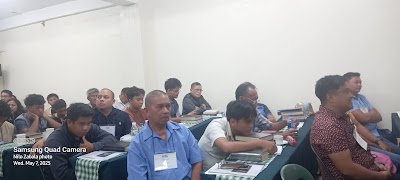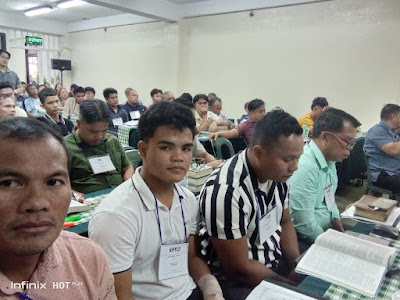When we first planned these classes, Jonathan Carino and I thought that there would be more desiring to take part in the classes due to the fact that schools would be out for their summer break and some college students in the local congregation would take part. We have always aimed for about 40 to 50 students as the ideal class size. As Jonathan began to hear from many preachers that they wanted to come for the classes, we increased the budget for the possibility of 60 to 70 students. However, the final count of students from Monday’s class was 124. On Tuesday and Wednesday, that number increased! The building is totally packed with students from high school and college age to elderly preachers and brethren who seem very eager to learn about this book.
Our classes on Ecclesiastes began on Tuesday morning with the second chapter of the book. We noted that Solomon experimented with pleasure and mirth to see if they provided a purpose and meaning to life. Since he was one of immense wealth, he could afford to seek a multitude of avenues to provide himself with the very most pleasure available. However, though they provided enjoyment for a time, these pleasures of life did not provide meaning and purpose to his life. It is good to enjoy these things for a time, but they should not be the main pursuit or focus of one’s life.
Chapter three of Ecclesiastes injects an introductory hint of a more fully developed theme towards the end of the book. It interjects a consideration of God’s place and purpose in this life “under the sun.” When one examines the world and our common experiences in life, we immediately see that life is filled with opposites that are part of our existence: birth and death, planting and plucking up, laughing and mourning, and the list goes on. Those “opposites” each have a place in God’s intent of making it more obvious that this life “under the sun” and its experiences, in and of themselves, do not provide an answer to the purpose we seek. But they do aid in teaching us principles and helping suggest the thought or possibility of eternity to our hearts.
We finished the day looking at the vanity of labor from Ecclesiastes chapter four. When one works to acquire more and more of an abundance to multiply wealth, the quest takes control of his life and he is never satisfied. The one who works to provide the needed food and necessities life and enjoys those provisions can truly enjoy them. Yet the one who seeks to amass wealth many times brings problems to his life rather than the satisfaction he seeks. Another factor is noted by Solomon in observing that one who has no companion fails to have the fulfillment of share together with another the blessings of life.
On Wednesday morning, we began by studying Solomon’s opening admonition in chapter five to approach God with reverent fear with an emphasis on hearing God’s instructions rather than speaking from our own thoughts. We had a lengthy discussion of the practices of the religious world around us are largely focused on what man wants and what pleases the masses, rather than worshiping God as He has commanded. Sadly, our own brethren are showing that same practice of seeking a kind of worship that makes them “feel” excited or tingly rather than focusing on true reverence of God. We must remember that God is the true “audience” of worship, not us. When our measure of worship is our enjoyment, rather than God’s praise as He commands, we have failed to understand the admonition of Solomon in this text.
We covered the remainder of Ecclesiastes 5 and 6 in the morning session. The text deals with the vanity of earthly wealth and honor. They are both fleeting and void of the ability to provide real meaning and purpose to our life in this physical realm.
Our afternoon session was completely consumed in an examination of Ecclesiastes 7. While we may prefer to be at a celebration or party for fun and entertainment, it does our heart better to be in the “house of morning” where we are caused to be sober and think seriously about our path of life and where it leads in the end. Other principles in the chapter call on us to consider the needed virtues of pursuing patience, wisdom and what may be learned from adversity. No, they are not what we naturally desire, but they bring us to be better. Though wickedness is prevalent in our world and sometimes seems to benefit the evil doers, the fact is that not all justice is meted out in this life. When we fail to consider the ultimate justice dispensed by God, we come to wrong conclusions about the meaning and purpose of life “under the sun.”
Thanks again for your interest in this work and your participation in it. God bless!
Brotherly, Harry






